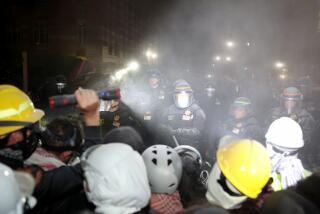OJAI : Free Toxic-Waste Disposal Is Held
Hundreds of cars and trucks lined up for an hour or more near Ojai, each carrying a toxic payload to be deposited with workers in white suits and safety goggles.
By the end of Saturday, 543 vehicles carrying a variety of household hazardous wastes crept through the line along Old Baldwin Road to unload pesticides, solvents, paints, motor oil and other substances that cannot be tossed legally into regular trash bins.
Kelly White, environmental manager of the Ventura Regional Sanitation District, said the Ojai Anti-Litter Station was too small to keep traffic moving.
The small site prevented workers from opening an express lane for people who only needed to dispose of oil and paint, substances that accounted for most of the material collected. These materials can be disposed of at the site each weekend during routine recycling activities, White said.
For more hazardous wastes, the district spent $125,000 to sponsor the half-day free disposal program Saturday. Sanitation workers collected about 3,300 gallons of recyclable liquids, 1,200 gallons of non-recyclable toxic liquids and 1,200 pounds of solid toxic waste.
The stream of cars and pickup trucks was continuous from shortly after 9 a.m., when collection began, until about 1 p.m., when workers stopped accepting new arrivals. Some people could not stand the wait and left the line without disposing of their toxic loads.
Although many of Saturday’s participants waited an hour and 20 minutes or longer, the average wait has been about 15 minutes at other collection events in Ventura County, White said.
Bill Dowdy, general manager of MSE Environmental Inc. of Camarillo, the firm hired to sort and dispose of the waste, said that most cars dropped off about twice as much waste as participants in other collection events.
Although the state Department of Health Services requires that no more than 50 pounds of dry material or five gallons of liquids be collected from each vehicle, Dowdy said that larger amounts were collected throughout the day.
“It’s a requirement that is rarely enforced,” he said, adding that it is better to accept the excess rather than force people to return it to their homes.
More to Read
Start your day right
Sign up for Essential California for news, features and recommendations from the L.A. Times and beyond in your inbox six days a week.
You may occasionally receive promotional content from the Los Angeles Times.






